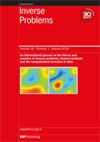针对非线性逆问题的带有学习特征选择规则的加速非精确牛顿正则化方案
IF 2
2区 数学
Q1 MATHEMATICS, APPLIED
引用次数: 0
摘要
对于计算反演问题,我们希望开发一种高效的反演算法,通过基于第一原理的数学模型将未知解与可测量量联系起来,从测量数据中找到解。然而,大多数数学模型只代表了相关物理量的几个方面,有些模型甚至是不完整的,即一个测量值对应于满足前向模型的多个解。在本文中,根据(2023 逆问题 39 055002)中最近开发的 iNETT 方法,我们提出了一种新颖的迭代正则化方法,用于高效解决具有潜在非注入式前向映射和(局部)非稳定反演映射的非线性问题。我们的方法集成了非精确牛顿迭代、非稳态迭代 Tikhonov 正则化、两点梯度加速方法和无结构特征选择规则。正则化技术的主要难点在于如何设计适当的正则化惩罚,以捕捉未知解的关键特征。为了克服这一困难,我们用深度神经网络代替了传统的正则化惩罚,深度神经网络是无结构的,可以在巨大的空空间中识别正确的解。在正则化理论的标准假设下,我们对所提出的算法进行了全面的收敛分析。此外,还针对两个模型问题进行了数值实验,并与其他最先进的方法进行了比较,以展示所提方法的效率。本文章由计算机程序翻译,如有差异,请以英文原文为准。
An accelerated inexact Newton regularization scheme with a learned feature-selection rule for non-linear inverse problems
With computational inverse problems, it is desirable to develop an efficient inversion algorithm to find a solution from measurement data through a mathematical model connecting the unknown solution and measurable quantity based on the first principles. However, most of mathematical models represent only a few aspects of the physical quantity of interest, and some of them are even incomplete in the sense that one measurement corresponds to many solutions satisfying the forward model. In this paper, in light of the recently developed iNETT method in (2023 Inverse Problems39 055002), we propose a novel iterative regularization method for efficiently solving non-linear ill-posed inverse problems with potentially non-injective forward mappings and (locally) non-stable inversion mappings. Our approach integrates the inexact Newton iteration, the non-stationary iterated Tikhonov regularization, the two-point gradient acceleration method, and the structure-free feature-selection rule. The main difficulty in the regularization technique is how to design an appropriate regularization penalty, capturing the key feature of the unknown solution. To overcome this difficulty, we replace the traditional regularization penalty with a deep neural network, which is structure-free and can identify the correct solution in a huge null space. A comprehensive convergence analysis of the proposed algorithm is performed under standard assumptions of regularization theory. Numerical experiments with comparisons with other state-of-the-art methods for two model problems are presented to show the efficiency of the proposed approach.
求助全文
通过发布文献求助,成功后即可免费获取论文全文。
去求助
来源期刊

Inverse Problems
数学-物理:数学物理
CiteScore
4.40
自引率
14.30%
发文量
115
审稿时长
2.3 months
期刊介绍:
An interdisciplinary journal combining mathematical and experimental papers on inverse problems with theoretical, numerical and practical approaches to their solution.
As well as applied mathematicians, physical scientists and engineers, the readership includes those working in geophysics, radar, optics, biology, acoustics, communication theory, signal processing and imaging, among others.
The emphasis is on publishing original contributions to methods of solving mathematical, physical and applied problems. To be publishable in this journal, papers must meet the highest standards of scientific quality, contain significant and original new science and should present substantial advancement in the field. Due to the broad scope of the journal, we require that authors provide sufficient introductory material to appeal to the wide readership and that articles which are not explicitly applied include a discussion of possible applications.
 求助内容:
求助内容: 应助结果提醒方式:
应助结果提醒方式:


